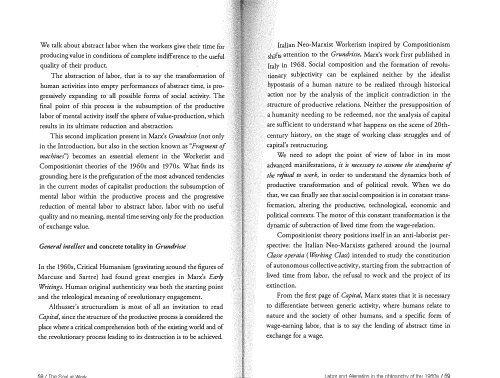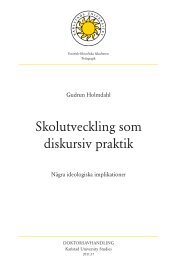Franco ''Bifo'' Berardi - The Soul at Work From Alienation to Autonomy
Franco ''Bifo'' Berardi - The Soul at Work From Alienation to Autonomy
Franco ''Bifo'' Berardi - The Soul at Work From Alienation to Autonomy
- No tags were found...
You also want an ePaper? Increase the reach of your titles
YUMPU automatically turns print PDFs into web optimized ePapers that Google loves.
LAhor and AlienAtion in the ohilosonrlV of lhfJ 19608 / 59We talk about abstract labor when rhe workers give their time forproducing value in conditions of complete indifference <strong>to</strong> rhe usefulquality of their product.<strong>The</strong> abstraction of labor, th<strong>at</strong> is <strong>to</strong> say the ttansform<strong>at</strong>ion ofhuman activities in<strong>to</strong> empty performances of abstract time, is progressively expanding <strong>to</strong> all possible forms of social activity. <strong>The</strong>final point of this process is the subsumption of the productivelabor of mental activity itself the sphere of value-production, whichresults in its ultim<strong>at</strong>e reduction and abstraction.This second implic<strong>at</strong>ion present in Marx's Grundrisse (not onlyin the Introduction, but also in the section known as "Fragment ofmachines") becomes an essential element in the <strong>Work</strong>erist andCompositionist theories of the 1960s and 1970s. Wh<strong>at</strong> finds itsgrounding here is the prefigur<strong>at</strong>ion of the most advanced tendenciesin the current modes of capitalist production: the subsumption ofmental labor within the productive process and the progressivereduction of mental labor <strong>to</strong> abstract labor, labor with no usefulquality and no meaning, mental time serving only for the productionof exchange value.General intellect and concrete <strong>to</strong>tality in GrundrisseIn the 1960s, Critical Humanism (gravit<strong>at</strong>ing around the figutes ofMarcuse and Sartre) had found gre<strong>at</strong> energies in Marx's EarlyWritings. Human original authenticity was both the starting pointand the teleological meaning of revolutionary engagement.Althusser's structuralism is most of all an invit<strong>at</strong>ion <strong>to</strong> readCapital, since the structure of the productive process is considered theplace where a critical comprehension both of the existing world and ofthe revolution<strong>at</strong>y process leading <strong>to</strong> its destruction is <strong>to</strong> be achieved.Italian Neo-Marxist <strong>Work</strong>erism inspired by Compositionismshifts <strong>at</strong>tention <strong>to</strong> the Grundrisse, Marx's work first published inItaly in 1968. Social composition and the form<strong>at</strong>ion of revolutionarysubjectivity can be explained neither by the idealisthypostasis of a human narure <strong>to</strong> be realized through his<strong>to</strong>ricalaction nor by the analysis of the implicit contradiction in thestructure of productive rel<strong>at</strong>ions. Neither the presupposition ofa humanity needing <strong>to</strong> be redeemed, nor the analysis of capitalare sufficient <strong>to</strong> understand wh<strong>at</strong> happens on the scene of 20thcenturyhis<strong>to</strong>ry, on the stage of working class struggles and ofcapital's restructuring.We need <strong>to</strong> adopt the point of view of labor in its mostadvanced manifest<strong>at</strong>ions, it is necessary <strong>to</strong> assume the standpoint ofthe refosal <strong>to</strong> work, in order <strong>to</strong> understand the dynamics both ofproductive transform<strong>at</strong>ion and of political revolt. When we doth<strong>at</strong>, we can finally see th<strong>at</strong> social composition is in constant transform<strong>at</strong>ion,altering the productive, technological, economic andpolitical contexts. <strong>The</strong> mo<strong>to</strong>r of this constant transform<strong>at</strong>ion is thedynamic of subtraction of lived time from the wage-rel<strong>at</strong>ion.Compositionist theory positions itself in an anti-Iaborist perspective:the Italian Neo-Marxists g<strong>at</strong>hered around the journalClasse operaia (<strong>Work</strong>ing Class) intended <strong>to</strong> study the constirutionof au<strong>to</strong>nomous collective activity, starting from the subtraction oflived time from labor, the refusal <strong>to</strong> work and the project of itsextinction.<strong>From</strong> the first page of Capital, Marx st<strong>at</strong>es th<strong>at</strong> it is necessary<strong>to</strong> differenti<strong>at</strong>e between generic activity, where humans rel<strong>at</strong>e <strong>to</strong>n<strong>at</strong>ure and the society of other humans, and a specific form ofwage-earning labor, th<strong>at</strong> is <strong>to</strong> say the lending of abstract time inexchange for a wage.






